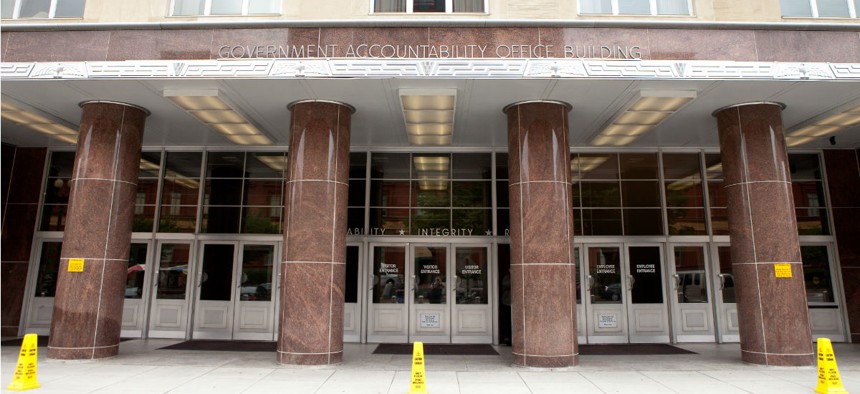
GAO headquarters in Washington. Mark Van Scyoc/Shutterstock.com
Congressional Watchdogs Ask Their Hill Masters for Budget Hikes
GAO and CBO say they face critical shortfalls in hiring and technology investments.
It’s not just ordinary Americans who are feeling financially pressed these days. The Government Accountability Office and the Congressional Budget Office on Tuesday appealed to lawmakers for more money in fiscal 2017. The extra money is needed to make critical investments in technology and personnel, they said.
GAO is seeking a 6.9 percent hike; CBO requested a 2.4 percent increase.
Testifying before the Senate Appropriations Legislative Branch Subcommittee, Comptroller General Gene Dodaro asked for $567.8 million next year, an additional $36.8 million over the agency’s current appropriation to rebuild staff during a wave of retirements and invest in information technology and security programs. “GAO expects to offset its costs by $32.4 million in receipts and reimbursements, primarily from financial audits and rental income,” he said.
Dodaro noted that GAO requires a knowledgeable workforce to meet its mission and warned that “a significant proportion of its employees will be retirement eligible by the end of fiscal year 2016, including 42 percent of GAO executive leadership and 25 percent of supervisory analysts.”
The extra money, he said, would enable GAO to continue rebuilding staff capacity to the equivalent of 3,100 full-time employees in 2017. Through a “robust, targeted recruitment program,” GAO plans to bolster entry-level and intern positions to create a pipeline to fill critical skill gaps.
The funds would also go toward training and development, and modernization of information technology infrastructure.
As he has in the past, Dodaro touted GAO’s “unprecedented return of about $134 for every dollar invested in GAO” -- work that last year generated an estimated $74.7 billion in financial benefits through cost-saving recommendations and other such activities.
At bat for CBO on Tuesday was Director Keith Hall, who requested $47.6 million for 2017, an increase of $1.1 million over last year’s budget.
Hall noted that his nonpartisan agency expects to produce 600 formal cost estimates, including those calculating the cost of requirements imposed by Congress on state, local and tribal governments and private sector enterprises. Additionally, CBO will estimate the budgetary impact of thousands of legislative proposals.
The budget hike would fund three new positions, boosting the agency’s staff from 235 to 238. The new analysts would be devoted to “health care issues and the economic effects of federal tax and spending policies,” Hall testified.
“Interest in modifying or replacing the Affordable Care Act and considering changes to Medicare or Medicaid remains high, and CBO expects to devote considerable attention to further developing its capacity to conduct dynamic analysis in the coming year.”
CBO staff it at its lowest level in more than a dozen years, Hall noted. In addition, during the budget crunch that produced a government shutdown in 2013, the agency “had to defer critical purchases of IT equipment and services and other items.”
(Image via Mark Van Scyoc/Shutterstock.com)







